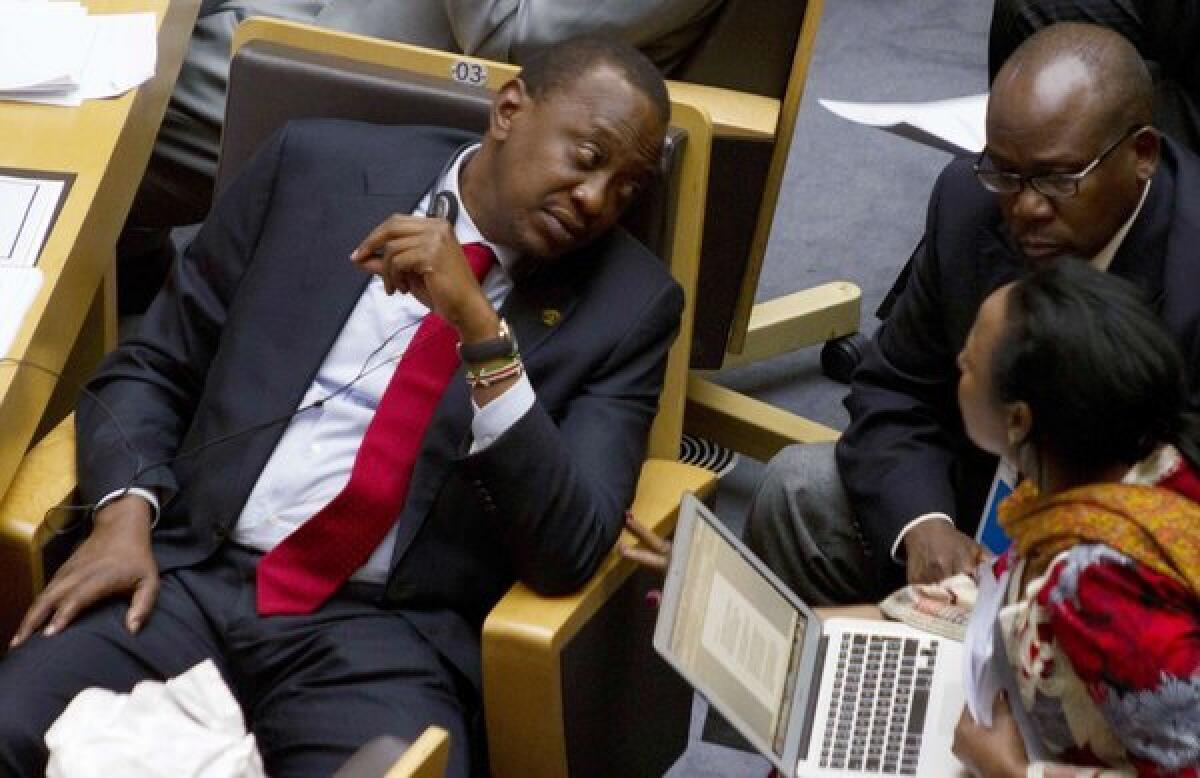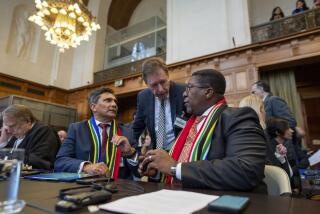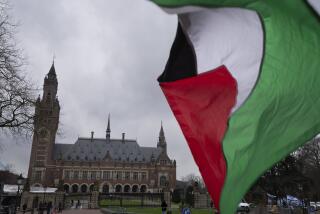African leaders call for International Criminal Court immunity

- Share via
JOHANNESBURG, South Africa - African Union leaders Saturday said that no sitting African leader should face trial by the International Criminal Court for heinous crimes.
But African opponents failed to win support for a mass withdrawal from the ICC at an AU summit in Addis Ababa, the Ethiopian capital, on Africa’s relationship with the court, according to news agencies.
After the summit, AU officials suggested that Kenyan President Uhuru Kenyatta would withdraw his cooperation with the court based in The Hague in his upcoming trial for crimes against humanity.
Ethiopian Foreign Minister Tedros Adhanom told journalists Saturday that the AU would call for Kenyatta’s trial to be deferred. He said if the request wasn’t met, the AU had agreed that Kenyatta should not attend his trial.
Kenyatta and his deputy, William Ruto, have been indicted on charges of crimes against humanity relating to ethnic violence after the disputed 2007 election. They were elected president and deputy president in March, despite the charges. Both men promised in debates before the election to cooperate with the court to clear their names. Yet both have since repeatedly called for charges to be dropped.
Kenya and other East African countries including Ethiopia, Uganda and Sudan, are highly critical of the court, accusing it of anti-Africa bias. Sudanese president Omar Al-Bashir also faces trial for crimes against humanity but has refused to appear before the court. Ruto is currently before the court and Kenyatta’s trial is due to begin next month.
Another Ethiopian official, foreign ministry spokesman Dina Mufti, said Saturday the charges against Kenyatta were “totally unacceptable”.
The AU resolution Saturday that sitting leaders should be immune from prosecution will not affect the Rome Statute that set up the court in 2002. Amendments to the statute only come into effect if ratified by seven-eighths of the court’s members.
But it suggests that African states, including Kenya, will refuse to cooperate when sitting leaders are indicted. This would complicate arrest warrants and investigations by the prosecutor’s office.
African Union chairman Hailemariam Desalegn, also Ethiopia’s prime minister, said at the close of the summit Saturday that the AU had decided that heads of state must be immune from prosecution.
“We have agreed no charge shall be commenced, or continued, before any international court or tribunal against any serving head of state or government or anybody acting...during his or her term in office,” he said. He added that criminal prosecution of leaders for crimes against humanity and other heinous acts was destabilizing and undermined peace.
Former U.N. Secretary General Kofi Annan on Monday rejected that argument, saying that when those who committed heinous crimes are prosecuted, it promotes peace.
International human rights groups like Human Rights Watch and Amnesty International, as well as more than 140 African civil society organizations, Monday called on AU leaders to support the court, amid fears of a mass desertion.
If African leaders withdraw their cooperation in cases where leaders are indicted for crimes against humanity, it would make it extremely difficult for ICC prosecutors to gather evidence. Already, ICC prosecutor Fatou Bensouda has complained that Kenyan authorities have been uncooperative in the Kenyatta and Ruto cases. She said those cases had seen an unprecedented level of threats, intimidation and bribery of witnesses.
Ten days ago, the court indicted Kenyan journalist Walter Barasa for bribing witnesses to refuse to testify against Kenyatta and Ruto, in the first case of its kind.
The African Union, established 12 years ago, was aimed at starting a new era of African accountability and transparency. A catch-phrase at the time was: African solutions for African problems.
The AU was officially launched in South Africa in 2002, the same year that many African states signed the Rome Statute.
The African Union replaced the Organization of African Unity, often criticized of serving as a gentlemen’s club for dictators and tyrants. The AU’s record has been better, but critics say the AU still tends behave like a club protecting the interests of incumbent leaders.
[For the record, 9:57 p.m. Oct. 12: An early version of this post incorrectly stated that Tedros Adhanom is Kenya’s foreign minister. He is Ethiopia’s foreign minister.]
ALSO:
Egyptian student’s death at protest to be probed
At least 27 drown in another migrant shipwreck south of Italy
Powerful Cyclone Phailin forces massive evacuations in India
Twitter: @latimesdixon
More to Read
Sign up for Essential California
The most important California stories and recommendations in your inbox every morning.
You may occasionally receive promotional content from the Los Angeles Times.










